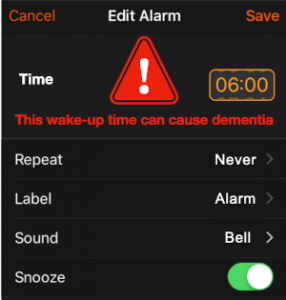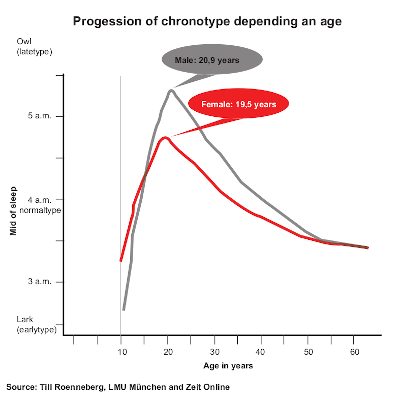
ATTENTION: THIS ALARM CLOCK CAN CAUSE DEMENTIA!
Should it be on the packaging of all alarm clocks in the future to avoid dementia? Over 75% of German employees wake up with the alarm clock during working days[1]YouGov 24.05.2016. This means that over 75% of Germans do not finish sleeping on weekdays, so sleep cannot fully perform its most important function (the regeneration of body and psyche). It has been scientifically proven that lack of sleep has negative effects on the psyche and health, but also increases the risk of obesity and the risk of addiction.
Dementia and alarm clock – Study finds connection
Sleep disorders are common in dementia, though it’s unclear whether differences in sleep architecture precede the onset of dementia. In a municipal Framingham Heart Study (FHS), the relationships between sleep architecture and the expected risk of dementia were investigated. Scientists from Boston University School of Medicine[2]Matthew P. Pase, Jayandra J. Himali, Natalie A. Grima, Alexa S. Beiser, Claudia L. Satizabal, Hugo J. Aparicio, Robert J. Thomas, Daniel J. Gottlieb, Sandford H. Auerbach and Sudha Seshadri, Sleep … Continue reading brought showd new insights. In a study with 321 participants, they were able to demonstrate that there is a direct connection between dementia and reduced REM phases in older people. It shows, that the more reduced REM phases, the higher the likelihood of dementia. The patients were on average 67 years old and were examined for the occurrence of various diseases during the study period. The average observation time was twelve years.
Results
32 cases of dementia were observed, 24 of which were consistent with Alzheimer’s dementia. After adjustment for age and gender, a lower REM sleep percentage and longer REM sleep latency (period from the end of the previous sleep phase to entry into REM sleep) were associated with a higher risk of dementia. Each percentage reduction in REM sleep was associated with an approximately 9% increase in the risk of dementia. More specifically, 1% less REM sleep availability was associated with a 9% higher risk of developing dementia. The average REM sleep share of total sleep is about 20-25%[3]https://de.wikipedia.org/wiki/REM-Schlaf. If we assume a genetic sleep requirement of 8h, the total time in which we are in the REM sleep stage is 2h or 120 minutes, if we can sleep in. So 1% means just 1 minute and 20 seconds.
To make it clear: 1 minute 20 seconds less Remschlaf means a 9% higher risk of later dementia.
Dementia and alarm clock – cause and effect
But what does the alarm clock have to do with it? The REM phases are particularly pronounced in the second half of sleep, while in the first half of sleep the Non Rem phases (3-4) dominate. In total, REM sleep accounts for around 20-25% of the total natural sleep period.

If we are woken up prematurely by the alarm clock (or any other external impulse such as smartphone, partner, etc.), this primarily affects the REM phases, which (depending on the chronotype) can then only take place extremely reduced. So if we are regularly woken up 2 hours earlier than our natural sleep needs require, a large part of the total REM sleep will cut off. The body tries to compensate for this with regularity by compressed REM phases. This process is called the REM rebound effect[4]https://pubmed.ncbi.nlm.nih.gov/32809548/. For some time, however, it has been suspected that this in turn can lead to increased anxiety and nightmares. Whether this can already be a symptomal precursor to a possible dementia is currently only a theory, anxiety and dementia are clearly related.
Insights and consequences
Since the alarmclock usually rings in the 2nd sleep phase with increased REM activity, these current findings now give rise to the suspicion that lack of sleep, in addition to anxiety and nightmares, also promotes the development of dementia in the long term.

If one assumes that especially young people, who, as has now been proven, are naturally more likely to be late types, are affected by the early start of school by the use of alarm clocks and thus also by an interruption of the REM phase, the idea is obvious that the foundations for later dementia could already be laid by school hours.
In addition, further studies have shown that reduced REM sleep is also associated with increased mortality[5]https://jamanetwork.com/journals/jamaneurology/fullarticle/2767713. Just as a mechanic needs time to repair a car, sleep needs time to regenerate the psyche. REM sleep plays a central role in this.
Result
The bringer of bad news is beheaded
Strictly speaking, the alarm clock is only the fringer of what humans tells it to do. Of course, an alarm clock itself cannot cause a risk of dementia if it stands still in the corner. Only the human being himself makes it a weapon against one’s own health. Incidentally this applies, of course, to any impulse that makes us wake up earlier. These can be the morning leaf vacuum, the road traffic or church bells. Therefore the place where we live can have just as much of an increased risk of dementia as our working and school hours.
The question is what influence we have on such impulses that rob us of REM sleep. An alarm clock mainly stands for working and school hours. These are the responsibility of employers, schools and politicians. Dementia is no longer a niche disease and the percentage increase in dementia is found to a large extent in our lifestyle and workstyle.
Chronotype-optimized working hours (COPEP) could be a key to a more well-rested and thus less susceptible to dementia society, as well as a learning system that takes chronotypes into account and recognizes the social potential in them. Actually, a win-win-win situation for everyone involved. Employees, employers and society. In our projects “Getting up without an alarm clock” and “ChronoClinic” we proved that, and have shown how it is possible to give more space to sleep, and especially REM sleep. A “That’s not possible because… “no longer counts. We should deal with the question “How do we manage that…!”.
Michael Wieden beschäftigt sich als Betriebswirt seit 2002 mit der Chronobiologie im Personalmanagement. Schon 2003 hielt er hierzu seinen ersten Vortrag auf einer Veranstaltung der INQA (Initiative der neuen Arbeit).
Zu den Themen „Chronobiologie im Personalmanagenement“ sowie mobilen Arbeitsformen hat er bereits Bücher geschrieben, und dabei den Begriff „Liquid Work®“ geprägt.
Zusammen mit Claudia Garrido Luque gründete er 2014 die aliamos GmbH und berät seit dem Kommunen, Unternehmen und Kliniken zum Betrieblichen Gesundheitsmanagement. Von 2012 bis Ende 2016 war er externer Wirtschaftsförderer für die Stadt Bad Kissingen und Initiator des weltweit einzigartigen Projektes „ChronoCity – Pilotstadt Chronobiologie“. Zu ChronoCity®, Chronobiologie-Themen und mobilen Arbeitsformen trat er wiederholt als Experte in verschiedenen Fernsehformaten (z.B. TerraX, Planet Wissen, W wie Wissen, Xenius etc.) auf. Zudem war er von 2014 bis 2017 Mitglied des Arbeitskreises „Zeitgerechte Stadt“ der ARL – Akademie für Raumforschung und Landesplanung in Hannover.
Aktuell hält er Vorträge zum Thema “Chronobiologie im Personalmanagement” und “Mobile Arbeitsformen”, und berät Unternehmen bei der Umsetzung chronobiologischer Ansätze in Unternehmen und Kliniken.
References
| ↑1 | YouGov 24.05.2016 |
|---|---|
| ↑2 | Matthew P. Pase, Jayandra J. Himali, Natalie A. Grima, Alexa S. Beiser, Claudia L. Satizabal, Hugo J. Aparicio, Robert J. Thomas, Daniel J. Gottlieb, Sandford H. Auerbach and Sudha Seshadri, Sleep architecture and the risk of incident dementia in the community, 2017 |
| ↑3 | https://de.wikipedia.org/wiki/REM-Schlaf |
| ↑4 | https://pubmed.ncbi.nlm.nih.gov/32809548/ |
| ↑5 | https://jamanetwork.com/journals/jamaneurology/fullarticle/2767713 |
